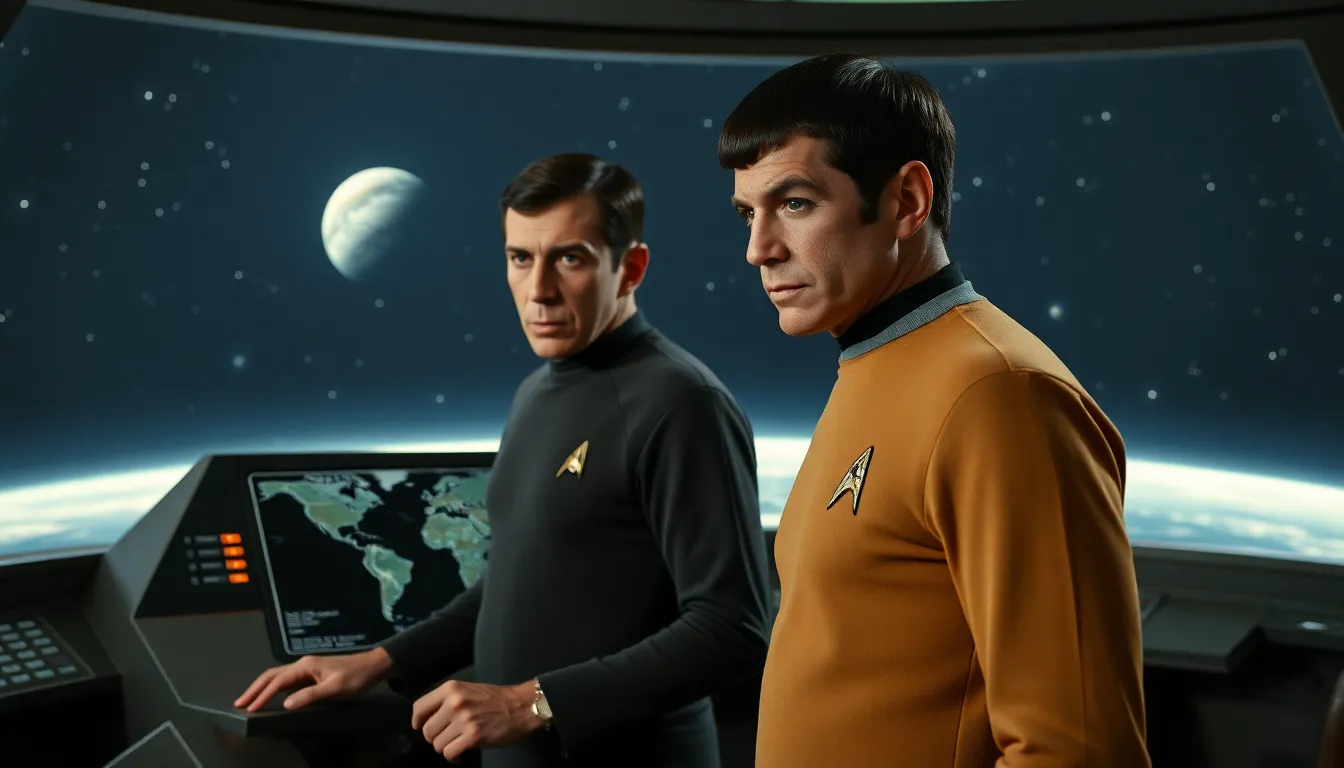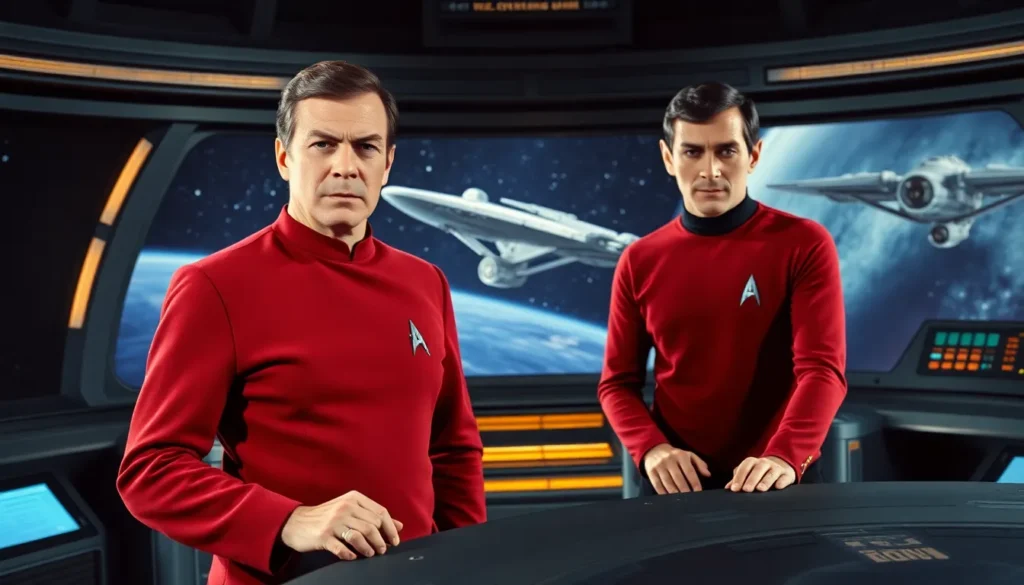In a galaxy not so far away, “Star Trek VI: The Undiscovered Country” boldly ventures into themes of peace, betrayal, and the occasional awkward dinner party. As the final film featuring the original crew, it’s a delightful mix of high-stakes diplomacy and interstellar shenanigans that keeps fans on the edge of their seats—and maybe laughing a little too.
Table of Contents
ToggleOverview of Star Trek VI: The Undiscovered Country
“Star Trek VI: The Undiscovered Country” premiered on December 6, 1991, and marked the final cinematic appearance of the original crew. This film delves deep into the dynamics of interstellar politics. It addresses the historic tensions between the United Federation of Planets and the Klingon Empire.
The narrative unfolds following a devastating attack on the Klingon Homeworld, which leaves the entire Empire facing extinction. Captain James T. Kirk and his crew grapple with the profound implications of peace and cohabitation. The plot intricately weaves elements of betrayal, as several characters harbor hidden agendas. Humor emerges through awkward social exchanges, showcasing the crew’s struggle to adapt to new diplomatic protocols.
William Shatner, as Captain Kirk, leads a stellar cast alongside Leonard Nimoy as Spock and DeForest Kelley as Dr. McCoy. The film blends engaging storytelling with philosophical musings on equality and understanding. It emphasizes embracing change, showcasing the need to confront lingering prejudices.
The production, directed by Nicholas Meyer, illustrates visually striking sequences that enhance the storyline. It features memorable quotes that challenge perceptions, making it resonate with audiences. “Star Trek VI” remains significant for its thought-provoking themes and dynamic characterization.
Cinematic elements include a powerful score by Cliff Eidelman, enhancing emotional depth throughout the film. The legacy is evident, as it paved the way for future Star Trek explorations. Overall, the film exemplifies the enduring appeal of the franchise while tackling relevant societal issues.
Plot Summary

“Star Trek VI: The Undiscovered Country” takes a profound look at the tensions between the United Federation of Planets and the Klingon Empire. Captain James T. Kirk and his crew face the complexities of peace negotiations following a devastating attack on the Klingon Homeworld. Themes of betrayal and subterfuge underpin the narrative, exposing hidden agendas amongst key players.
Key Characters
Captain James T. Kirk, portrayed by William Shatner, leads the crew through political turmoil. Spock, played by Leonard Nimoy, serves as a voice of reason, balancing logic with emotion. Dr. McCoy, featured by DeForest Kelley, offers medical insights and heartfelt conversations that reflect human condition. A formidable antagonist, Chancellor Gorkon, introduces the audience to Klingon motivations while highlighting their willingness to embrace peace.
Major Themes
Exploration of peace remains central to the film. Characters grapple with their biases and fears, highlighting the impact of historical grievances. Betrayal surfaces as a dominant theme, with espionage challenging alliances. Humor appears amidst serious exchanges, allowing for moments of levity in tense situations. The film concludes with a significant message about unity and coexistence, encouraging audiences to reflect on contemporary societal issues.
Cinematic Techniques
“Star Trek VI: The Undiscovered Country” employs various cinematic techniques that enhance storytelling and visual engagement. Directed by Nicholas Meyer, the film showcases a masterful blend of direction, effects, and storytelling that captivates audiences.
Directorial Approach
Meyer’s direction emphasizes character-driven narratives. Strong performances from the cast spotlight emotional nuances and complex themes. He balances action with philosophical queries, creating thought-provoking moments. Dynamic pacing maintains engagement throughout the film. Meyer utilizes close-ups to capture the characters’ emotional weight during crucial scenes. The contrast of light and shadow enhances dramatic tension, underlining moments of betrayal and conflict. Subtle humor appears amid tense exchanges, reinforcing character relationships and easing the narrative flow. The director’s choices effectively appeal to both new viewers and long-time fans, culminating in a rich cinematic experience.
Special Effects
Innovative special effects elevate the visual storytelling of the film. Practical effects combine with miniatures, creating realistic space scenes. Notably, the Klingon Bird-of-Prey cloaking effect exemplifies cutting-edge technology for its time. Visual effects contribute to a palpable sense of scale during space battles. Seamless integration of CGI further enhances critical action sequences while maintaining authenticity. Attention to detail in set design immerses viewers in the Star Trek universe. Each visual element complements the narrative, ensuring coherence throughout the film. The effects team’s dedication reflects the franchise’s commitment to quality, solidifying its position in science fiction cinema.
Reception and Impact
“Star Trek VI: The Undiscovered Country” received a positive reception, reflecting its significative impact on both audiences and critics alike.
Box Office Performance
The film grossed approximately $96 million worldwide against a budget of $27 million. Opening weekend earnings reached about $9.2 million in the United States, placing it in the top tier of 1991’s box office hits. This strong performance validated its appeal to fans and newcomers. Its ability to attract a diverse audience underscored the franchise’s enduring popularity and relevance. Appealing themes of diplomacy and cooperation resonated with viewers, enhancing its financial success.
Critical Reviews
Critics generally praised the film for its engaging narrative and rich character development. Rotten Tomatoes shows a 84% approval rating, indicating strong critical acclaim. Reviewers highlighted performances by Shatner, Nimoy, and Kelley as particularly compelling. The thoughtful exploration of societal themes earned admiration, with many noting its commentary on real-world issues. Emphasis on humor amidst tension contributed to a balanced viewing experience. The film’s direction by Nicholas Meyer received recognition for effectively blending action with deeper philosophical questions.
Legacy of Star Trek VI: The Undiscovered Country
“Star Trek VI: The Undiscovered Country” holds a significant place in the Star Trek franchise due to its exploration of timely themes such as peace, betrayal, and reconciliation. Audiences recognize its relevance, especially in the context of real-world political dynamics. The film’s narrative resonates with ongoing discussions about diplomacy and cooperation.
The finale of the original crew is impactful, as it encapsulates the growth of characters like Captain Kirk and Spock. Both characters evolve through their experiences, showcasing complex emotions and moral dilemmas reflective of societal issues. Humor is skillfully woven into the script, providing relief while addressing serious subjects.
Nicholas Meyer’s direction stands out for balancing action and character-driven storytelling. Techniques such as innovative special effects and strong performances elevate the film’s emotional experience. Critics often highlight how the production team committed to quality, enhancing the realism of space sequences and set design.
Reception data showcases the film’s commercial success and critical acclaim. Grossing around $96 million worldwide, it outperformed its budget of $27 million, marking a relevant achievement in cinema history. Additionally, the 84% approval rating on Rotten Tomatoes emphasizes its positive impact on both audiences and critics.
The movie’s legacy extends beyond its storyline, inspiring discussions about unity and coexistence. Themes explored continue to resonate, prompting viewers to reflect on contemporary social issues. Ultimately, “Star Trek VI” reinforces the enduring appeal of the franchise and its ability to tackle complex themes while entertaining its audience.
“Star Trek VI: The Undiscovered Country” stands as a powerful testament to the franchise’s ability to address complex themes while entertaining audiences. Its exploration of peace and betrayal resonates deeply in today’s world. The film’s rich character development and dynamic storytelling highlight the importance of understanding and cooperation.
With memorable performances from the original crew and Nicholas Meyer’s expert direction, it leaves a lasting impact on viewers. The blend of humor and serious themes creates a unique cinematic experience that encourages reflection on societal issues. As the final chapter for the original crew, it solidifies their legacy and the enduring relevance of Star Trek’s message about unity and coexistence.




